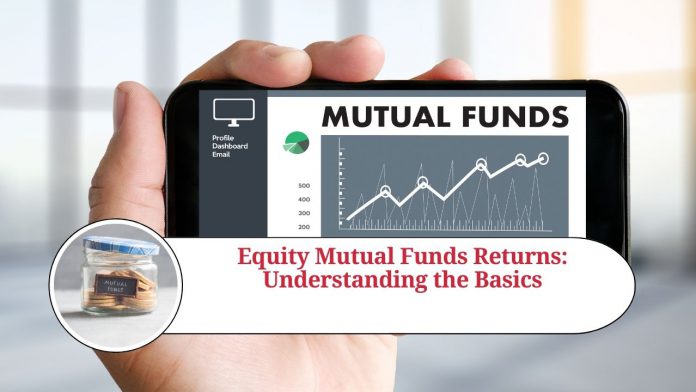Investing in mutual funds is one of the most popular investment options for individuals. Among mutual funds, equity mutual funds are a popular choice for investors seeking higher returns in the long term. Equity mutual funds invest primarily in stocks of companies across different sectors, with the aim of generating capital appreciation for investors. However, before investing in equity mutual funds, it is crucial to understand the basics of returns from these funds. In this blog, we will discuss the fundamentals of equity mutual funds returns and what investors should keep in mind while investing in them.
What are Equity Mutual Funds Returns?
Equity mutual funds’ returns refer to the profit or loss generated by the mutual fund scheme during a specific period. It is calculated by taking into account the change in the net asset value (NAV) of the scheme over a given period. For example, if an equity mutual fund scheme’s NAV increases from Rs. 10 to Rs. 12 in a year, the scheme’s return for the year will be 20%.
Equity mutual funds returns can be further classified into two types – absolute returns and relative returns. Absolute returns refer to the percentage increase or decrease in the NAV of the scheme over a given period, while relative returns compare the scheme’s performance against a benchmark index such as Nifty 50 or BSE Sensex.
Factors Affecting Equity Mutual Funds Returns
Several factors influence equity mutual funds returns. Some of the key factors are:
- Market conditions: Equity mutual funds’ returns are significantly impacted by the overall market conditions. In a bullish market, most equity mutual funds tend to perform well, while in a bearish market, most funds tend to underperform.
- Fund Manager’s Expertise: A fund manager’s expertise plays a crucial role in equity mutual funds’ returns. A skilled fund manager can identify undervalued stocks, allocate assets efficiently, and generate higher returns.
- Sectoral Exposure: Equity mutual funds’ returns can also be affected by the sectors in which they invest. For example, a fund with a high exposure to the technology sector may perform better than a fund with a high exposure to the energy sector, depending on the market conditions.
- Expense Ratio: An equity mutual fund’s expense ratio is the annual fee charged by the fund house to manage the fund. A higher expense ratio can significantly impact the fund’s returns.
- Investment Horizon: Equity mutual funds’ returns are more significant over a more extended investment horizon. Short-term fluctuations in the market may cause volatility in returns. Still, over the long term, equity mutual funds have the potential to generate higher returns compared to other investment options.
Conclusion
Equity mutual funds have the potential to generate higher returns than other investment options. However, investors need to understand the basics of returns, including absolute and relative returns, and factors affecting them. Investors should consider their risk appetite, investment horizon, and financial goals before investing in equity mutual funds. By doing so, investors can make informed decisions and maximize their returns while minimizing their risks.
Read more useful content:
- How to invest in mutual funds
- All about mutual funds-types & importance
- The Power of SIP Investment in Mutual Funds
Frequently Asked Questions (FAQs)
Q. What is an equity mutual fund?
An equity mutual fund is a type of mutual fund that invests primarily in stocks of companies across different sectors, with the aim of generating capital appreciation for investors.
Q. What are equity mutual fund returns?
Equity mutual fund returns refer to the profit or loss generated by the mutual fund scheme during a specific period. It is calculated by taking into account the change in the net asset value (NAV) of the scheme over a given period.
Q. How are equity mutual fund returns calculated?
Equity mutual fund returns are calculated by taking the change in the net asset value (NAV) of the scheme over a given period and expressing it as a percentage of the initial NAV. For example, if an equity mutual fund scheme’s NAV increases from Rs. 10 to Rs. 12 in a year, the scheme’s return for the year will be 20%.
Q. What are the types of equity mutual fund returns?
Equity mutual fund returns can be classified into two types – absolute returns and relative returns. Absolute returns refer to the percentage increase or decrease in the NAV of the scheme over a given period, while relative returns compare the scheme’s performance against a benchmark index such as Nifty 50 or BSE Sensex.
Q. What factors affect equity mutual fund returns?
Several factors influence equity mutual funds returns, including market conditions, fund manager’s expertise, sectoral exposure, expense ratio, and investment horizon.
Q. How can investors maximize their returns from equity mutual funds?
Investors can maximize their returns from equity mutual funds by choosing the right fund based on their risk appetite and financial goals, diversifying their investments across different sectors and asset classes, and staying invested for the long term.
Q. Are equity mutual funds a good investment option?
Equity mutual funds can be a good investment option for investors seeking higher returns in the long term. However, investors should consider their risk appetite and financial goals before investing in equity mutual funds.




















